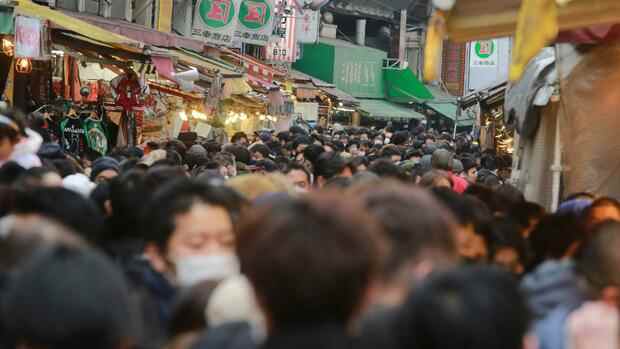The retail trade in the East Asian country is constantly developing new occasions that are intended to animate the Japanese to give – and to buy.
(Photo: AP)
Tokyo For Valentine’s Day, how about a toilet-shaped waffle filled with red-brown bean paste? The museum of the Japanese company Lixil is touting this recreation of an ancient Japanese sweet as a new alternative to the traditional Valentine’s gift: chocolate.
February 14 has great significance in Japan’s consumer culture. Weeks before the date, department stores and supermarkets fill their shelves and online shops with more than 100 different chocolate assortments. In Japan, women traditionally give chocolate to their colleagues or male friends for Valentine’s Day.
In the corona pandemic, the day has become a high point for retailers – and a symbol of the change in Japanese consumption. So reports the
Department store chain Takashimaya. Online sales of Valentine’s Day products have more than doubled since 2020.
Top jobs of the day
Find the best jobs now and
be notified by email.
Local business is also strong, at least at the chain’s local branch in Gunma Prefecture. According to a manager in the business newspaper “Nikkei”, chocolate sales had already increased by three percent in 2021. For this year he expects an increase of another five percent.
Marco Koeder, a Japan-based advertiser, explains, “Japan has the strongest gift culture in the world, around which a large industry has developed.”
Retailers stock a wide range of gifts all year round, local confectionery shops thrive thanks to souvenirs, specialist farmers sell polished gift strawberries for 100 euros or finely veined melons that can cost several hundred euros. In Japan, society and business have created many occasions for gift-giving in order to strengthen connections – and mutual obligations – between people.
Companies invent new occasions
If you visit friends, of course you bring a gift. Colleagues and family are also given presents after business or holiday trips. Gifts between business partners are also mandatory in summer and on New Year’s Day.
Additionally, companies have invented other occasions such as White Day in March. On this day, men should give chocolate to the women who gave them something on Valentine’s Day. In addition, festivals were converted to consumption occasions, including imports such as Christmas and Halloween.
A recent development that retailers are excited about is that the Japanese are now more concerned about their well-being. The abrupt spread of telecommuting has led the Japanese to buy less inexpensive ‘giri-choko’ (mandatory chocolate) for co-workers. On the other hand, the demand for more luxurious products is increasing as part of the pandemic “revenge consumption”.
Marketing experts use the term “revenge consumption” to mean the trend that people reward themselves for the restrictions caused by the corona virus.
That’s not the only sales driver for more expensive products. According to marketing expert Koeder, the pandemic is also increasing the popularity of small manufacturers who do all the chocolate production themselves.
Craft is gaining in importance
Koeder also blames the work from the home office for this: “Due to Corona, manual work is becoming much more important again because people have more time because of telework and therefore do more themselves.” This would make them appreciate manual work more.
Retailers, meanwhile, are trying to expand the Valentine’s market from men to women and from chocolate to other confectionery to boost sales. There are already signs that this is succeeding.
The student Sesora Murakami has temporarily finished with Giri-Choko and gifts to male fellow students: “In my generation, female friends in particular give each other chocolate,” she says. The buzzword is “Tomo-Choko”, friendship chocolate.
>>Read here: Thalia boss Michael Busch on the state corona measures: “This is the death zone”
In addition, suppliers are constantly developing new chocolate products. For example, a processed agricultural products store in central Japan’s Hyogo Prefecture advertises a type of tofu pudding with the slogan, “Why don’t you give another gift?”
The department store chain Sogo & Seibu, on the other hand, offers Valentine’s sets that combine chocolate with other luxury items. Among them is a bundle with macaroons from luxury confectioner Pierre Hermé Paris, a tea set from a well-known Japanese ceramic brand and a stay at a thermal bath. The price: 2500 euros.
More: Benko partner Chirathivat – The beacon of hope for European luxury department stores is struggling with the crisis
